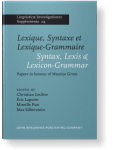Instrument Nouns and Fusion
Predicative nouns designating violent actions
Many predicative nouns selecting the support verb dar (to give) in Portuguese allow Conversion, a passive-like transformation, with the support verb levar (to take, to get). Among these, a significant number are related with concrete instrument nouns and expresses violent action predicates. These sentences present a paraphrase with the verbs bater (to hit) or ferir (to hurt) with an instrument complement. Most of these predicative nouns are formed with a common suffix (-ada). Several restrictions can be observed in the choice of the instrument complements that can be inserted in the nominal sentences. High redundancy blocks the insertion of an instrumental complement if the instrument is the same noun as the one to which the predicative nouns is morphologically related. We analyse these nominal sentences by Fusion, a transformational relation proposed by M. Gross (1981), which merges the verbs bater or ferir with the instrument noun to form both the predicative noun and (more rarely) its associated verb.
Cited by (1)
Cited by one other publication
Barreiro, Anabela, Cristina Mota, Jorge Baptista, Lucília Chacoto & Paula Carvalho
2022.
Linguistic resources for paraphrase generation in portuguese: a lexicon-grammar approach.
Language Resources and Evaluation 56:1
► pp. 1 ff.

This list is based on CrossRef data as of 11 july 2024. Please note that it may not be complete. Sources presented here have been supplied by the respective publishers.
Any errors therein should be reported to them.
